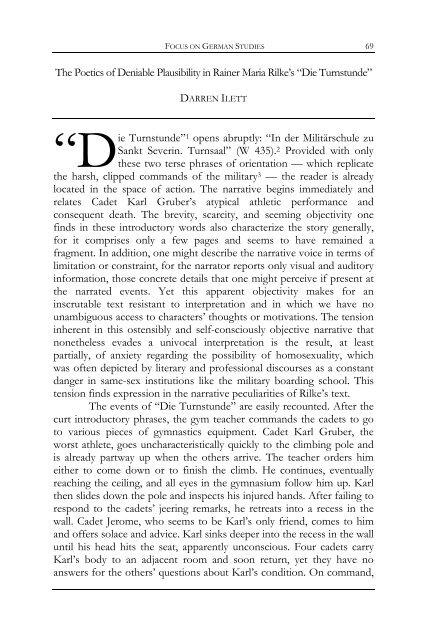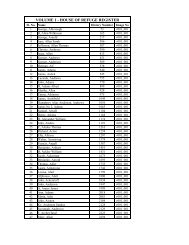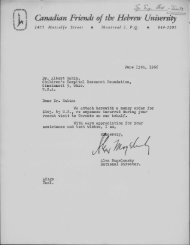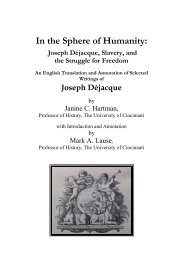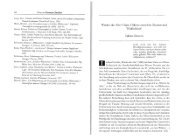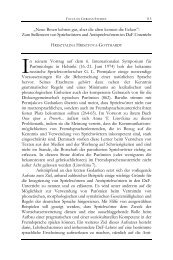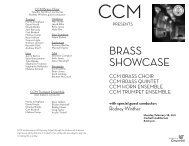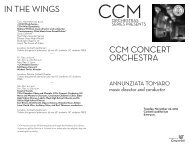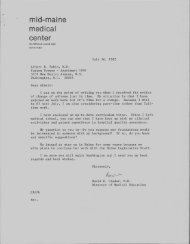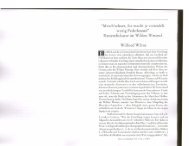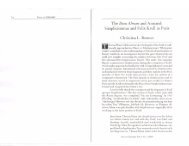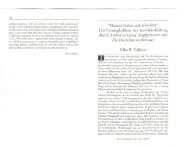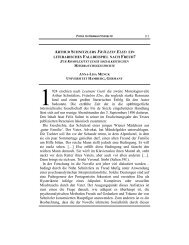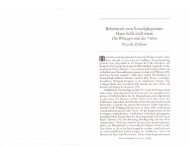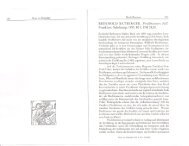Rilke's Die Turnstunde.pdf - UC DRC Home
Rilke's Die Turnstunde.pdf - UC DRC Home
Rilke's Die Turnstunde.pdf - UC DRC Home
Create successful ePaper yourself
Turn your PDF publications into a flip-book with our unique Google optimized e-Paper software.
FOCUS ON GERMAN STUDIES 69<br />
The Poetics of Deniable Plausibility in Rainer Maria Rilke’s “<strong>Die</strong> <strong>Turnstunde</strong>”<br />
DARREN ILETT<br />
“D<br />
ie <strong>Turnstunde</strong>” 1 opens abruptly: “In der Militärschule zu<br />
Sankt Severin. Turnsaal” (W 435). 2 Provided with only<br />
these two terse phrases of orientation — which replicate<br />
the harsh, clipped commands of the military 3 — the reader is already<br />
located in the space of action. The narrative begins immediately and<br />
relates Cadet Karl Gruber’s atypical athletic performance and<br />
consequent death. The brevity, scarcity, and seeming objectivity one<br />
finds in these introductory words also characterize the story generally,<br />
for it comprises only a few pages and seems to have remained a<br />
fragment. In addition, one might describe the narrative voice in terms of<br />
limitation or constraint, for the narrator reports only visual and auditory<br />
information, those concrete details that one might perceive if present at<br />
the narrated events. Yet this apparent objectivity makes for an<br />
inscrutable text resistant to interpretation and in which we have no<br />
unambiguous access to characters’ thoughts or motivations. The tension<br />
inherent in this ostensibly and self-consciously objective narrative that<br />
nonetheless evades a univocal interpretation is the result, at least<br />
partially, of anxiety regarding the possibility of homosexuality, which<br />
was often depicted by literary and professional discourses as a constant<br />
danger in same-sex institutions like the military boarding school. This<br />
tension finds expression in the narrative peculiarities of Rilke’s text.<br />
The events of “<strong>Die</strong> <strong>Turnstunde</strong>” are easily recounted. After the<br />
curt introductory phrases, the gym teacher commands the cadets to go<br />
to various pieces of gymnastics equipment. Cadet Karl Gruber, the<br />
worst athlete, goes uncharacteristically quickly to the climbing pole and<br />
is already partway up when the others arrive. The teacher orders him<br />
either to come down or to finish the climb. He continues, eventually<br />
reaching the ceiling, and all eyes in the gymnasium follow him up. Karl<br />
then slides down the pole and inspects his injured hands. After failing to<br />
respond to the cadets’ jeering remarks, he retreats into a recess in the<br />
wall. Cadet Jerome, who seems to be Karl’s only friend, comes to him<br />
and offers solace and advice. Karl sinks deeper into the recess in the wall<br />
until his head hits the seat, apparently unconscious. Four cadets carry<br />
Karl’s body to an adjacent room and soon return, yet they have no<br />
answers for the others’ questions about Karl’s condition. On command,
70 THE POETICS OF DENIABLE PLAUSIBILITY IN RAINER MARIA RILKE’S “DIE TURNSTUNDE”<br />
the cadets continue their exercises. Krix, another cadet, listens at the<br />
door of the room where Karl has been taken and then spreads the news<br />
among the cadets that the doctor has arrived. Everyone eventually stops<br />
their exercises to stare at the door that conceals Karl’s body. An officer<br />
commands the cadets to line up, but they remain still. Another officer<br />
reemerges from the room to announce that Karl has died of a heart<br />
attack and then immediately orders the cadets to march out of the<br />
gymnasium. As the cadets exit, Krix jumps to Jerome’s side and<br />
whispers that he has seen Karl’s naked body and then bites Jerome’s<br />
sleeve. With that peculiar action, the story ends as abruptly as it begins.<br />
Much of the scholarship on “<strong>Die</strong> <strong>Turnstunde</strong>” focuses on the<br />
relationship between Rilke’s works and his experiences as a student at<br />
the Austro-Hungarian military academies in St. Pölten and Mährisch-<br />
Weißkirchen. 4 Other research considers the structure of the text and its<br />
language and situates “<strong>Die</strong> <strong>Turnstunde</strong>” in Rilke’s oeuvre generally and<br />
in relationship to his novel The Notebooks of Malte Laurids Brigge<br />
specifically. 5 The crucial topic of sexuality remains, however, relatively<br />
unexamined. The intention of an analysis of the depiction of sexuality in<br />
the text is not to resolve its ambiguity; rather, it is to illustrate how<br />
sexuality serves as a point of convergence for other tensions in the text.<br />
The same tensions also inform Rilke’s comments regarding the text’s<br />
composition as well as its later reception. Each of these areas displays<br />
anxiety surrounding the status of knowledge, especially concerning<br />
sexuality, and in each this anxiety produces a characteristic move of<br />
simultaneous iteration and disavowal, a partial covering-of-one’s-tracks<br />
or deniable plausibility. 6<br />
Eve Sedgwick addresses such anxiety in Epistemology of the Closet<br />
where she claims an incommensurable but forever shifting and<br />
unpredictable divide in Western culture between prescribed homosocial<br />
bonds and proscribed homosexuality for men. However, the sorts of<br />
prescribed male bonding that play an integral part in “male heterosexual<br />
entitlement” — such as “male friendship, mentorship, admiring<br />
identification, bureaucratic subordination, and heterosexual rivalry”—<br />
also and at the same time include “forms of investment” that resemble<br />
those of an always proscribed homosexuality (185-86). Therefore, “it<br />
appears that men enter into adult masculine entitlement only through<br />
acceding to the permanent threat that the small space they have cleared<br />
for themselves on this terrain may always, just as arbitrarily and with just<br />
as much justification, be foreclosed” (186). Sedgwick further argues in<br />
Between Men that homophobic violence has the effect of controlling all<br />
men; that “no man must be able to ascertain that he is not (that his
FOCUS ON GERMAN STUDIES 71<br />
bonds are not) homosexual” has resulted in “a structural residue of<br />
terrorist potential, a blackmailability, of Western maleness through the<br />
leverage of homophobia” (88-89). Sedgwick terms this structure of<br />
constant uncertainty “homosexual panic,” the internalized form of<br />
homophobic social violence (Epistemology 185). The concurrent<br />
prescription and proscription of male homosocial bonds, not to mention<br />
the stakes involved in the exceedingly unpredictable task of determining<br />
and remaining on the sanctioned side of the arbitrary definition of<br />
homosexuality, make life in a military academy one especially charged<br />
with homosexual panic (Epistemology 186).<br />
The peculiar tone of “<strong>Die</strong> <strong>Turnstunde</strong>,” one of mystery and rapt<br />
attention, turns on the thematics of the limits of knowledge and the<br />
anxiety caused by expressing or knowing too much or too little.<br />
Miscommunication, uncertainties, secrets, revelations, and anomalous,<br />
enigmatic behavior abound in the narrative. Each stage is structured<br />
around an epistemological irregularity: the first is dominated by Karl’s<br />
inexplicable physical effort and by the cadets as astounded onlookers;<br />
the second recounts the process of Karl’s death which goes largely<br />
unnoticed; and the last is marked by the cadets’ intense, hushed interest<br />
in discovering his fate.<br />
One can understand the pivotal act of the first section — Karl’s<br />
climb — either as insubordination against a command, an unusual<br />
physical feat, or the expression of desperation (Kayser 45). That is, Karl<br />
is either acting against the authoritarianism of the military academy, in<br />
accordance with it (but to an exaggerated degree), or he is rejecting the<br />
situation and the institution completely. The text supports all three<br />
interpretations of Karl’s climb, respectively: he notices the officer’s<br />
anger “mit besonderem Vergnügen”; he manages to do something<br />
which “er sonst niemals begreifen konnte,” yet he does so<br />
“unwillkürlich” (W 435); and he strives for the ceiling “als hätte er einen<br />
Ausweg in der Decke des Saales endeckt und strebte danach, ihn zu<br />
erreichen” (W 436). 7 The narrator expresses the inscrutability of<br />
motivation and the opacity of Karl’s action by placing it “in einer etwas<br />
dämmerigen Ecke des Saales” (making it difficult for others to see) (W<br />
435) and by depicting the pole as “unermeßlich” (emphasizing Karl’s<br />
own inability to understand his act) (W 436). 8 It remains undecidable<br />
whether Karl acts willfully or is under the control of some unknown<br />
(and perhaps unknowable) power.<br />
Another epistemological issue is the ambivalence of human<br />
interaction. Characters repeatedly pay one another too little or too much<br />
attention. The cadets and officer on duty fail to notice Karl until he is
72 THE POETICS OF DENIABLE PLAUSIBILITY IN RAINER MARIA RILKE’S “DIE TURNSTUNDE”<br />
already clinging fairly high up the pole (W 435). He returns the favor<br />
with his own willful inattention to the officer’s commands. All the<br />
cadets’ eyes then follow Karl’s movements. Apparently sensing, but not<br />
actually turning around to see, their collective gaze, “macht er hoch<br />
oben unter der Decke eine Bewegung, als wollte er sie abschütteln; und<br />
da ihm Das [sic] offenbar nicht gelingt, bindet er alle diese Blicke oben<br />
an den nackten eisernen Hacken.” 9 Having diverted their attention to<br />
the hook, “saust [er] die glatte Stange herunter, so daß alle immer noch<br />
hinaufsehen, als er schon längst, schwindelnd und heiß, unten steht.” 10<br />
Despite the rapt attention with which the cadets watch Karl’s climb,<br />
they fail to notice his movements. Then Karl stares “mit seltsam<br />
glanzlosen Augen in seine glühenden Handflächen” (W 436). 11 He<br />
beholds his hands with the kind of attention the others give his<br />
climbing: one which excludes everything apart from the specific object<br />
of interest yet nevertheless fails to yield the understanding it seeks. That<br />
his eyes are “glanzlos” merely stresses the failure of perception.<br />
Other failures of communication in the first section compound<br />
the difficulties of (in)attention. Karl is a silent figure. After he slides<br />
down the pole, the cadets around him inquire about his irregular action<br />
(W 436). He appears to want to answer, but then hesitates and quickly<br />
lowers his eyes. He censors himself, having internalized their contempt.<br />
By the time he thinks of a response, the others have lost interest and<br />
gone away (W 436). The only word Karl utters in the entire story is a<br />
frightened “Was?” (“What”). The word is a condensation of the story’s<br />
many confusions and attempts at discovery, all the more so because of<br />
the quality of Karl’s voice. He responds “mit seiner gewöhnlichen, in<br />
Speichel watenden Stimme” (W 437). 12 This quality of Karl’s voice — as<br />
if it were wading in saliva — is not the result of overexertion but his<br />
usual voice. It is as if Karl were always drowning in his own saliva. He<br />
struggles to utter this single word, even to Jerome, the only character<br />
with whom he has any sort of caring, personal contact.<br />
In the story’s second section, we encounter two similar<br />
(non)exchanges. Jerome speaks to him, but it seems Karl fails to hear;<br />
instead “er schaut geradeaus in den Saal hinein, aber so, als sähe er etwas<br />
Unbestimmtes, vielleicht nicht im Saal, draußen vielleicht, vor den<br />
Fenstern, obwohl es dunkel ist, spät und Herbst.” 13 Again, it is as if Karl<br />
is in a trance-like state and thus cannot see or communicate with others.<br />
As he gradually loses consciousness, Jerome does not notice until he<br />
hears Karl’s head hit the seat, and this despite their physical proximity<br />
and conversation (W 437). The characters alternate between intense<br />
concentration and distraction: the single-mindedness of military
FOCUS ON GERMAN STUDIES 73<br />
discipline readily slips into obliviousness. Perception seems inadequate,<br />
even for a sharply defined object of interest which nevertheless remains<br />
inscrutable.<br />
The story’s final two sections present additional epistemological<br />
issues, namely the relationship between circulation and knowledge, and<br />
the nature of secrets and their discovery. There is a double move of<br />
circulation here. First, it seems imperative to remove Karl’s body from<br />
sight. What had been the figure of a highly visible inscrutability is now<br />
altered into a hidden one, the figure of a secret. Second, the information<br />
that Karl has collapsed travels quickly among the cadets in the<br />
gymnasium, causing a great deal of curiosity: “Dann hastige Fragen:<br />
‘Was? Was? Wer? Der Gruber? Wo?’ Und immer mehr Fragen.” 14 These<br />
questions float in the story, neither attributed to nor directed toward a<br />
particular character. Another anonymous cadet says loudly,<br />
“Ohnmächtig” (“unconscious”), but otherwise no information is<br />
exchanged. Upon their return from removing Karl’s body, the others<br />
naturally press them with questions, since these four have had direct<br />
contact with Karl. They ask: “Wie sieht er aus? Was ist mit ihm? Ist er<br />
schon zu sich gekommen?” (W 438). 15 But these four know nothing.<br />
The impetus to discover what has become the (now concealed<br />
but ultimately ascertainable) secret of Karl’s body continues, despite—<br />
and because of — the four cadets’ ignorance. On command, the cadets<br />
resume their exercises but with a change in the atmosphere and in their<br />
movements, “als hätte ein Horchen sich über sie gelegt.” 16 The group is<br />
overcome and unified by the drive to discover Karl’s secret. Even their<br />
voices undergo a transformation: “<strong>Die</strong> Stimmen sind weniger verworren<br />
und ihre Summe summt feiner, als ob alle immer nur ein Wort sagten:<br />
‘Ess, Ess, Ess...’” (W 438). 17 Their noises are unified and uniform. The<br />
language is accentuated here: the repeated “mm” in “Stimmen,”<br />
“Summe,” “summt,” and “immer” reproduces the cadets’ humming<br />
onomatopoetically, and the “wor” found in “verworren” is literally<br />
entangled in the word “Wort.” The cadets’ voices are joined in a confused,<br />
intertwined, and oppressive unity. The form the noise takes also changes<br />
from the 1899 to the 1902 version of the text under consideration here.<br />
In the former, the cadets’ word was “Es” (SW 599). The shorter spelling<br />
seems to refer to an unknown but specific “it,” that is, the secret<br />
something they all want to discover about Karl. The addition of a<br />
second “s,” however, lengthens the fricative, thereby making it a hiss, an<br />
ominous, threatening sound.<br />
It is at this particular moment — one of concentrated,<br />
threatening group attention — that Cadet Krix appears for the first time
74 THE POETICS OF DENIABLE PLAUSIBILITY IN RAINER MARIA RILKE’S “DIE TURNSTUNDE”<br />
in the narrative. He at once interrupts and sharpens the group’s<br />
listening: “Der kleine schlaue Krix horcht inzwischen an der<br />
Kammertür.” 18 When the non-commissioned officer runs him away with<br />
a swat on the behind, “Krix springt zurück, katzenhaft, mit hinterlistig<br />
blitzdenden Augen.” 19 But he is successful: “Er weiß schon genug” (W<br />
438). 20 Krix alone discovers what is happening on the other side of the<br />
door, namely that the regiment doctor has arrived. The “Horchen” —<br />
or, as the English translation has it, “a need to keep listening” — that<br />
has descended on them finds its embodiment and active form in him.<br />
Krix then disappears from the narrative until the last few lines, at the<br />
same moment that Jerome is mentioned again. The latter “fühlt sich<br />
plötzlich am Arm gefaßt, so angesprungen.” Krix hangs on him, and<br />
“[s]eine Augen glänzen und seine Zähne schimmern, als ob er beißen<br />
wollte.” 21 Desire, violence, and knowledge, all closely associated with<br />
Krix, return in this passage, and are again intertwined with the status of<br />
Karl as a secret. “‘Ich hab ihn gesehen,’ flüstert er atemlos und preßt<br />
Jeromes Arm und ein Lachen ist innen in ihm und rüttelt ihn hin und<br />
her. Er kann kaum weiter: ‘Ganz nackt ist er und eingefallen und ganz<br />
lang.’” 22 He bites into Jerome’s sleeve and laughs “spitz und kitzlich” (W<br />
440). 23<br />
Krix’s excitement derives at least partially from the fact that he<br />
possesses a secret and is able to disclose it to another person. Georg<br />
Simmel’s 1907 essay on secrets offers a way of conceiving of that<br />
excitement. He claims that “[d]as Geheimnis gibt der Persönlichkeit eine<br />
Ausnahmestellung, es wirkt als ein sozial bestimmter Reiz.” 24 Simmel<br />
cites as the source of this exceptional status and its consequent social<br />
appeal two related phenomena necessarily a part of any secret: first, the<br />
pronounced exclusion of outsiders and, second, a corresponding sense<br />
of ownership. (318). Krix, who, because of his small stature, probably<br />
occupies a relatively low position in the social hierarchy of the military<br />
academy, here feels himself privileged above the other cadets, for the<br />
possession of secret knowledge about Karl affords him a temporarily<br />
exceptional, higher status. Yet, according to Simmel, a secret also always<br />
entails an inherent tension which finds its release in the moment of<br />
revelation. One realizes and experiences the full significance of a secret<br />
only at the moment one divulges it (319). There is also a certain power<br />
in knowing that one can disclose a secret, that is “die Macht zu<br />
Schicksalswendungen und Überraschungen, zu Freuden und<br />
Zerstörungen” (320). 25 Besides the elevated social position that the<br />
possession of the secret of Karl’s body affords Krix, it also allows him
FOCUS ON GERMAN STUDIES 75<br />
to inform, to surprise, and to inflict emotional pain: in short, to control<br />
the knowledge of that body.<br />
Krix takes obvious physical pleasure in this exchange. He can<br />
barely utter the words due to an inner laughter that shakes his body. He<br />
whispers them breathlessly as his eyes gleam and teeth shimmer.<br />
Language is again highlighted here and underscores Krix’ animal-like<br />
nature. Both passages in which Krix appears are dominated by the<br />
sounds “x,” “tz,” and “ch,” which mimic those of a hissing cat (W 438,<br />
440). His animalistic aspect underscores the erotic pleasure he derives<br />
from seeing the corpse and subsequently describing it to Jerome.<br />
Friedrich Loock, apparently the only scholar who has noted this<br />
passage’s homoeroticism, posits the sadistic and homoerotic pleasure<br />
which Krix gains from his position. According to Loock, Krix’<br />
epistemological and voyeuristic pleasure draws from the control of the<br />
mysterious body that has proved too defiant and performed a feat that<br />
Krix and his fellow cadets dare not attempt for fear of punishment<br />
(122). While Loock’s observation is apt, Krix performs an additional<br />
function along the familiar lines of deniable plausibility. While<br />
demonstrating the erotic pleasure of learning, possessing, and divulging<br />
a secret, this character simultaneously contains the deviant, dangerous<br />
possibilities associated with him. The narrator and reader participate in<br />
the pleasures he represents — and the homoeroticism that attends them<br />
— from the safe distance that this odd, animalistic character seems to<br />
demand.<br />
If Krix exemplifies the eroticism of secret knowledge, Karl is<br />
the embodiment of the sexual secret. In a diary entry, Rilke refers to him<br />
as “de[r] blasse Mondsüchtige mit der flachen Brust” (Tagebücher 161). 26<br />
Indeed, his surname has similar significations of morbidity and<br />
exhaustion: “Grube” can designate a (mining) pit, hole, cavity, or open<br />
grave. Karl is thereby characterized by death and degeneration. His<br />
anomalous and exaggerated athletic performance appears in this context<br />
as another sign of degeneration: in the final stages of physical decay, the<br />
body produces a final surge of energy before expiring. One might also<br />
read Karl’s climb symbolically as one of the period’s common causes of<br />
degeneration, namely masturbation. The phallic connotation of the pole<br />
is obvious, but its dim, semi-hidden location also points to the illicit,<br />
sexual nature of the act. So, too, do the discomfort Karl feels as the<br />
object of the cadets’ collective gaze and the concern over his injured<br />
hands. Rilke’s choice of the word “nackt” to describe the hook is<br />
similarly telling. While signifying “bare” in this instance, the word<br />
nevertheless retains the connotation of nudity and thereby connects this
76 THE POETICS OF DENIABLE PLAUSIBILITY IN RAINER MARIA RILKE’S “DIE TURNSTUNDE”<br />
image to that of Karl’s corpse at the end of the story, which, as we have<br />
seen, Krix also describes as “ganz nackt.”<br />
A key passage in “<strong>Die</strong> <strong>Turnstunde</strong>” has Karl looking for a<br />
second time at his hands, this time “ganz darüber gebückt wie einer, der<br />
bei wenig Licht einen Brief entziffern will” (W 436-37). 27 He is alienated<br />
from his body and sexuality — which are depicted as illegible and<br />
foreign — and he approaches them as one would something to be<br />
analyzed and understood. This enterprise is not free from difficulty or<br />
stigma, however. It is as if there were little light to undertake it, and<br />
when Jerome approaches, Karl “erschrickt” (“is startled”) as if caught<br />
committing a proscribed act (W 437). This scene is emblematic of the<br />
status of homosexuality at the turn-of-the-century. Regarding same-sex<br />
desire, Sedgwick asserts that “there had in fact developed one particular<br />
sexuality that was distinctively constituted as secrecy: the perfect object<br />
for the by now insatiably exacerbated epistemological/sexual anxiety of<br />
the turn-of-the-century subject” (Epistemology 73). This epistemological<br />
terrain is typified, as Sedgwick points out, by the “imponderable and<br />
convulsive” relations of the open secret (Epistemology 80). The figure of<br />
Karl intently and anxiously attempting to decode his hands in a semisecret<br />
dim corner illustrates both the contemporary conditions of<br />
homosexual (self-)knowledge and the limits of depicting homosexuality.<br />
It also parallels at once the difficulty and interpretive labor required of<br />
the reader confronted with this inscrutable text as well as the narrator’s<br />
position and strategies.<br />
In his essay on “<strong>Die</strong> <strong>Turnstunde</strong>,” Dirk Dethlefsen addresses<br />
the issue of its narrator. He argues that the story presents neither a<br />
narrator nor a character with which readers might identify and thus<br />
frustrates attempts at orientation (249). Gérard Genette’s narrative<br />
concepts help to specify the particular type of narration Dethlefsen<br />
describes. “<strong>Die</strong> <strong>Turnstunde</strong>” is an example of what Genette calls<br />
“simultaneous narrating” in the present tense. It appears to unfold along<br />
with the events it recounts and thus seems “like the height of objectivity,<br />
since the last trace of enunciating […] now disappears in a total<br />
transparency of the narrative” (219). This apparent objectivity is also<br />
enhanced by a “heterodiegetic” narrator, one that is not a character in<br />
the story (248). Our narrator also features “external focalization” which<br />
designates a narrator who shares no knowledge of the characters’<br />
thoughts (189-90). At first glance this seems to describe the narrator<br />
exactly and accounts for Dethlefsen’s claim that there is no tangible<br />
narrator. Despite the accuracy of Dethlefsen’s observations, “<strong>Die</strong><br />
<strong>Turnstunde</strong>” does nevertheless contain a narrative voice. However, it
FOCUS ON GERMAN STUDIES 77<br />
constantly attempts to cover any trace of its existence — with one<br />
important exception. The narrator accomplishes this partial and selfconscious<br />
erasure by limiting severely the attribution of intent. We know<br />
nothing of Karl’s thoughts except the narrator’s suppositions about<br />
them. The exception to, or perhaps ultimate evidence of, the narrator’s<br />
“objectivity” takes the form of these speculations in the form of<br />
comparisons: the narrator often uses subjunctive verbs and comparative<br />
phrases such as “als ob” (as if) and “wie” (like or as) and the verb<br />
“scheinen” (to appear). Such a strictly limited narrator can only surmise<br />
what characters are thinking; and this scrupulous narrator never fails to<br />
mark assumptions as such. The characteristic move of “<strong>Die</strong><br />
<strong>Turnstunde</strong>,” that of deniable plausibility, here simultaneously marks the<br />
limits of the narrator’s knowledge and oversteps those limits. Since the<br />
narrator’s conjectures constitute the only information by means of<br />
which we have access to characters’ inner states, they retain a narrative<br />
authority despite their being marked as dubious. These statements invite<br />
us to read them as authoritative at the same time as they withdraw from<br />
authority. The tension between this narrative lack (the narrator’s inability<br />
to know characters’ thoughts) and simultaneous excess (the assumptions<br />
about those thoughts that the narrator nonetheless provides) makes any<br />
univocal interpretation impossible and preempts the association of the<br />
narrator with the possibility sexually illicit subject matter.<br />
Not only do these suppositions attempt to describe an ultimately<br />
unknowable (or simply proscribed) reality, they do so in a way opposed<br />
to and distinct from that of the military academy. Whereas the latter<br />
forcibly imposes a particular knowledge or behavior and allows no room<br />
for doubt, the former makes suggestions which are emphatically marked<br />
by doubt. Dethlefsen understands these features as Rilke’s effort to<br />
break from narrative conventions, such as a confident narrator who<br />
directs and limits the reader’s interest, and to shock the reader into a<br />
new, more intense type of attention (253-54). They are also the signs,<br />
according to Dethlefsen, of a fundamental inability to narrate<br />
experience, a theme explored in more depth in Malte (245).While this is<br />
certainly the case, Dethlefsen does not examine this narrative impasse in<br />
its relationship to the story’s homoerotic elements. In our discussion of<br />
Rilke’s writings on his boarding school experiences and of the studies<br />
about him, the arbitrarily shifting valences of homosexual definition<br />
produce an anxiety that manifests itself in deniable plausibility. This<br />
strategy allows for the withdrawal from a particular position should that<br />
position suddenly be foreclosed by the forever shifting definition of<br />
homosexuality.
78 THE POETICS OF DENIABLE PLAUSIBILITY IN RAINER MARIA RILKE’S “DIE TURNSTUNDE”<br />
Anxieties about homosexuality which inform the narrative<br />
strategies in “<strong>Die</strong> <strong>Turnstunde</strong>” can also be found in Rilke’s diaries and<br />
journals regarding his boarding school experiences. This story makes up<br />
part of what Rilke apparently intended to develop, perhaps along with<br />
the short story “Pierre Dumont,” into a novel set in a military academy<br />
(Butler 18). Indeed, in the journal entry immediately preceding the first<br />
version of “<strong>Die</strong> <strong>Turnstunde</strong>” Rilke declares: “Seltsam, nachts wurde<br />
plötzlich der Militärroman so dringend, daß ich glaubte, ich würde,<br />
wenn nicht sofort, so doch wenigstens heute beginnen müssen, ihn zu<br />
schreiben.” 28 A journal entry immediately following the story makes it<br />
clear that Rilke was planning an episode which depicted Karl’s burial (T<br />
169). Thus, while turning away from the project for the moment, he<br />
intended to continue the narrative. Unfortunately, this seems never to<br />
have occurred. Nevertheless, Rilke continued his engagement with “<strong>Die</strong><br />
<strong>Turnstunde</strong>,” and a revised version was first published in the 1 February<br />
1902 edition of <strong>Die</strong> Zukunft, approximately three years after Rilke<br />
composed the first draft (W 862).<br />
The question arises as to why Rilke felt compelled to begin<br />
writing his military novel and, only a few hours later, wrote that the<br />
same topic “tritt jetzt als gleichberechtigt mit zwei, drei anderen Stoffen<br />
auf und nicht einmal als inniges Bedürfnis, sondern als literarische<br />
Absicht” (T 161). 29 This is a moment in which an intense, personal<br />
matter is transformed into a literary work. The two exist in a tense<br />
relationship with each other, one threatening to overcome the other.<br />
This tension produced “<strong>Die</strong> <strong>Turnstunde</strong>,” which Rilke later admired, so<br />
much so that he singled it out as the only short prose piece he would<br />
have liked to have included in the 1921 edition of his early works (W<br />
862). Yet that same tension also prevented further work on his proposed<br />
military novel, with the possible exception of the prose fragment<br />
“Erinnerung” in 1914.<br />
In his journal Rilke explains his difficulties with the theme of the<br />
military academy thus:<br />
Auch erscheint mir der Stoff, je mehr ich mich an ihn<br />
verliere, immer noch unmöglich und grob; noch fühle<br />
ich nicht die Geschicklichkeit, diese Gesellschaft von<br />
Knaben in ihrer ganzen Roheit und Entartung, in dieser<br />
hoffnungslosen und traurigen Heiterkeit zu zeigen . . .<br />
diese ganze Masse beständig als solche wirken zu lassen,<br />
erscheint mir ebenso wichtig wie schwer. Denn der<br />
einzelne ist ja eben — auch der verdorbenste — Kind,
FOCUS ON GERMAN STUDIES 79<br />
was aber aus der Gemeinsamkeit dieser Kinder sich<br />
ergibt, — das wäre der herrschende Eindruck —, eine<br />
schreckliche Gesamtheit, die wie ein fürchterliches<br />
Wesen wirkt, welches bald diesen und bald jenen Arm<br />
verlangend ausstreckt (T 161). 30<br />
Scholars such as Loock have rightfully highlighted the fact that this<br />
passage indicates the importance Rilke placed on the project of depicting<br />
the harsh, totalitarian nature of the military academy (119-21).<br />
Additionally, as York-Gothart Mix argues, the passage illustrates the<br />
discrepancy Rilke felt between the subjective understanding of a<br />
personal experience and the depiction of that experience in literary form<br />
(62).<br />
Yet what Loock and Mix overlook is that the anxiety of this<br />
passage finds expression in sexualized images. Rilke fears losing himself<br />
to the material he is attempting to depict, which takes on a seductive,<br />
overwhelming, and destructive quality. He deems it “grob” and doubts<br />
his ability to render fully the “Roheit und Entartung” of this<br />
“Gesellschaft von Knaben.” This last phrase emphasizes the subjects’<br />
youth but also the exclusive same-sex nature of the circumstances. He<br />
uses the term “verdorben” to describe the worst type of boarding school<br />
pupil. And finally, the “Masse” of boys takes the form of a<br />
“fürchterliches Wesen” which extends its arms in every direction,<br />
“verlangend.” This passage both demonstrates the anxiety caused by the<br />
forced homosocial community and the source of that anxiety in the<br />
constant possibility that it might be of a sexually deviant nature, or at<br />
least understood as such. The images also parallel the oppressive unity<br />
of the cadets’ voices in “<strong>Die</strong> <strong>Turnstunde</strong>” as they await news of Karl’s<br />
fate (W 438). Finally, the passage describes the tension between the<br />
urgency to depict the social constellation of the military academy and the<br />
trepidation Rilke felt in doing so. The two-part move of deniable<br />
plausibility that characterizes Rilke’s remarks about “<strong>Die</strong> <strong>Turnstunde</strong>”<br />
serves as one strategy for navigating the double bind that Sedgwick<br />
outlines. The literary theme of the boarding school proves too close for<br />
Rilke, both because of the similarity to his own experiences and the<br />
danger of being engulfed in the process of depicting it. In narrating the<br />
boarding school, one might unwittingly express what always runs the<br />
risk of being understood as homosexual thematics. Strategies of<br />
disavowal allow the space for both the expression of a homosocial<br />
milieu, with its ever-present homoerotic possibilities, and the<br />
containment of the latter.
80 THE POETICS OF DENIABLE PLAUSIBILITY IN RAINER MARIA RILKE’S “DIE TURNSTUNDE”<br />
This anxiety — along with strategies of disavowal and oblique<br />
reference — expanded beyond Rilke’s own understanding of “<strong>Die</strong><br />
<strong>Turnstunde</strong>” to its reception as well. Two related controversies<br />
regarding his years at the military academy — the sincerity of Rilke’s<br />
later depictions of his suffering there and the circumstances of his early<br />
release from the Mährisch-Weißkirchen academy — seem to have begun<br />
with Rilke’s letter, dated 4 December 1894, to his then fiancée Valerie<br />
von David-Rhonfeld in which he told of his experiences at the military<br />
academy. Regarding his intention to leave the school, he described the<br />
latter period of his tenure as spent primarily in the infirmary, due more<br />
to grief than physical illness (Sieh 165). Rilke also shared the story of his<br />
friend Fried with whom he developed “eine auf gegenseitiger<br />
Übereinstimmung beruhende wahrhaft brüderliche Neigung” and “einen<br />
Bund — fürs Leben” which they sealed “mit Kuss und Handschlag.” 31<br />
Rilke mentioned the jealousy that accompanied their relationship and<br />
the tear-filled nights he spent waiting for Fried’s return from a trip. Yet<br />
Fried later grew aloof. Rilke learned “dass Mitzöglinge unseren reinen<br />
Bund in den Schmutz gezogen und Fried überdies von höheren Orts<br />
Weisung erhalten hatte nicht so viel mit dem Narren zu verkehren” (Sieh<br />
166). 32 David-Rhonfeld later transposed Rilke’s account into three<br />
possible reasons for his release: “ein Gerücht sagte wegen<br />
‘Kränklichkeit,’ das andere wegen ‘Narretei’ und das dritte bezichtigte<br />
ihn der Knabenliebe” (Hirschfeld 715). 33<br />
Taking up these themes, the controversy about Rilke’s military<br />
school years has persistently continued. One can divide the two<br />
positions assumed by Rilke’s biographers and literary scholars thus:<br />
those who doubt Rilke’s suffering in the academy and those who dismiss<br />
what they understand as rumor and emphasize instead the sincerity of<br />
Rilke’s remarks on his school years. Peter Demetz, who falls in the<br />
former camp, argues that Rilke’s complaints about his suffering in the<br />
academy amount to subsequent exaggeration and self-stylization (36-37).<br />
Further, Demetz’ argument sexualizes Rilke’s relationship with his<br />
mother, Phia, and renders her as an overbearing, emasculating force and<br />
a possible cause of perversion (39). To this suspicious description<br />
Demetz adds that Rilke’s fellow cadets asked for his dismissal from the<br />
academy (40-41). He also claims that Rilke admitted to David-Rhonfeld<br />
that he was expelled because of a “Sittlichkeitsaffäre” (41). 34 Demetz’<br />
statements seem calculated to cause speculation about Rilke’s sexuality.<br />
In a related move, the Rilke biographer E. M. Butler’s comments on the<br />
cult that developed around him also lend Rilke an effeminate and<br />
sentimental air, two attributes closely related with the gender-inversion
FOCUS ON GERMAN STUDIES 81<br />
model of male homosexuality (5). Butler’s summary of Rilke’s friendship<br />
with his fellow cadet Fried is telling; she terms it a “conventional” and<br />
“well-worn” “story” and writes that it “recalls public-school novels of<br />
the more lurid and distressing type” (17). Taken as a whole, these critical<br />
interpretations of Rilke and his boarding school years create the<br />
impression of a coddled artist with a tendency toward hypochondria and<br />
self-stylization who is too close to his mother and therefore ostracized<br />
from his classmates but nevertheless has a suspicious relationship with<br />
another boy (for which he is sent home shamefully).<br />
The opposing trend, exemplified in the studies by Hans-<br />
Christoph Kayser and Byong-Ock Kim, is to “recuperate” Rilke’s image<br />
by shifting the focus toward the reality of his suffering and away from<br />
intimations of homosexuality. Kayser cites a long series of letters and<br />
prose works in which Rilke consistently depicts the horrors of school<br />
life (46-50). In open opposition to Demetz, Kayser concludes from this<br />
mass of evidence that the consistency and sheer number of Rilke’s<br />
damning references to the military academy substantiate the fact that his<br />
time there was marked by real suffering (50). In another extensive study<br />
of Rilke’s military academy experiences, Kim sharply criticizes Demetz’<br />
methods and conclusions. He accuses Demetz of careless research and<br />
contends that there was no scandal upon Rilke’s departure and that,<br />
rather, Rilke was released early and not expelled (75-76). Kim argues that<br />
Demetz’ rhetoric amounts to a thinly veiled accusation of dishonesty on<br />
Rilke’s part (74). He concludes that his real aim is an attack on Rilke’s<br />
character and that Demetz therefore loses all claim to scholarly<br />
objectivity (75-77). Kim then turns his attention to Valerie von David-<br />
Rhonfeld. According to Kim, she was simply embittered by the<br />
disappointment of her first love and therefore intent on degrading<br />
Rilke’s reputation (77). The importance of Kim’s criticism here lies less<br />
in the facts surrounding the end of Rilke’s military education than it<br />
does in the tone of the criticism. It seems this is more than a simple<br />
correction of scholarly methods. Kim’s criticisms may be true, but his<br />
fervor arises from the threat to Rilke’s reputation. The anxiety that Kim<br />
seems to express has to do with the type of accusations being made:<br />
denials of intimations of “Knabenliebe” and a “Sittlichkeitsaffäre” here<br />
give rise to a disproportionate amount of passion.<br />
The issue is not the truth of Rilke’s adolescence, but how it is<br />
deployed. As we have seen, David-Rhonfeld, Demetz, and Butler<br />
attempt to demythologize Rilke. However, the terms they use to<br />
humanize Rilke’s image reveal something akin to schadenfreude in<br />
“dragging him in the filth” of homosexual suspicion. Those who take
82 THE POETICS OF DENIABLE PLAUSIBILITY IN RAINER MARIA RILKE’S “DIE TURNSTUNDE”<br />
issue with them see it as their task to defend Rilke’s honor against<br />
outlandish accusations of aberrant sexuality (and the related images of<br />
the coddled, effeminate, self-styled, hypochondriac artist). Both sides<br />
display misogynist tendencies, especially Demetz in his discussion of<br />
Phia Rilke’s unhealthy influence on her son and Kim in his criticism of<br />
David-Rhonfeld’s memories of Rilke. Both sides take part in the anxiety<br />
of the constitutive uncertainty of homosexual definition.<br />
It is on at least three levels, then, that the functions of policing<br />
and defining the boundary between sanctioned homosocial behavior and<br />
illicit sexuality occur: Rilke’s school experiences and his anxieties about<br />
depicting them, the textual strategies of “<strong>Die</strong> <strong>Turnstunde</strong>,” and the<br />
reception of the text and Rilke’s image. The narrative itself thus takes<br />
part in a larger discourse regarding Rilke’s sexuality. This set of<br />
discourses presents a range of textual responses to the anxiety attending<br />
the project of narrating the military boarding school, an<br />
epistemologically complex space given its self-contradictory and<br />
concurrent prescription of a homosocial “schreckliche Gesamtheit” and<br />
proscription of homosexuality. The deniable plausibility that Rilke<br />
creates in his journal entry regarding “<strong>Die</strong> <strong>Turnstunde</strong>” — the<br />
oscillation of his engagement with the topic of the boarding school —<br />
suggests the anxiety he experienced regarding this problematic,<br />
homosocial institution and its literary depiction. In the story,<br />
homosexual panic creates the necessity for and possibility of narrative<br />
innovation that turns on the limits of knowledge and the possibility of<br />
knowing or expressing too much, a possibility that the narrator in “<strong>Die</strong><br />
<strong>Turnstunde</strong>” endeavors to control through disavowal. Ironically, he<br />
retains narrative authority precisely by drawing away from it. A certain<br />
narrative distance both allows for the depiction of the totalizing<br />
homosocial environment of the military academy and presents the limits<br />
of the project. Taken together, Rilke’s letters, journals, and prose that<br />
touch on the military academy form a sparse and indirect, yet rich and<br />
compelling commentary on the relationship among homosociality,<br />
homoeroticism, and narrative. In fact, with careful attention, the<br />
narrator’s assessment of Krix might tacitly apply just as well to the<br />
possibilities and limitations of the reader’s knowledge: “Er weiß schon<br />
genug.”<br />
University of Chicago
FOCUS ON GERMAN STUDIES 83<br />
Notes<br />
1 The title is translated either as “The Gym Class” or “The Drill-Class.” German citations of<br />
the published 1902 version are taken from the third volume of Rilke’s Werke<br />
(hereafter cited as W). Occasional citations are from the original 1899 version<br />
contained in the fourth volume of Rilke’s Sämtliche Werke (hereafter cited as SW).<br />
English citations of this text are from Appelbaum’s translation. All other<br />
translations from German texts are my own.<br />
2 “In the military school at Sankt Severin. Gymnasium” (85).<br />
3 See especially Minder 77; Mix 63; and Ryan 71 for observations on this similarity.<br />
4 See especially Demetz, Kayser, and Kim.<br />
5 See especially Dethlefsen, Loock, Mix, and Ryan.<br />
6 Cf. Downing, especially 178-79, on the disavowal of narrative authority as a strategy in<br />
German realism.<br />
7 “with particular pleasure”; “he has never before been able to understand”; “involuntarily”<br />
(85); and “as if he had discovered a way out in the ceiling of the gym and were<br />
striving to reach it” (87).<br />
8 “in a rather shady corner of the gym” (85) and “immeasurable” (87).<br />
9 “high up below the ceiling he makes a gesture as if he wanted to shake them off; and since<br />
he obviously doesn’t succeed in this, he ties all those gazes to the bare iron hook<br />
up there” (87).<br />
10 “he whizzes down the smooth pole so fast that everyone is still looking upward after he<br />
has been standing down below for some time” (87).<br />
11 “at his burning palms with oddly dulled eyes” (87).<br />
12 “in his usual, saliva-clogged voice” (87).<br />
13 “he is looking straight into the gym, but as if he saw something indefinable, perhaps not in<br />
the gym, outdoors perhaps, right outside the windows, even though it’s dark and<br />
late on an autumn day” (89).<br />
14 “Then, hasty questions: ‘What? What? Who? Gruber? Where?’ And more and more<br />
questions” (89).<br />
15 “How does he look? What’s wrong with him? Has he come to yet?” (91).<br />
16 “as if overlaid by a need to keep listening” (91).<br />
17 “The boys’ voices are less confused and their humming has a more delicate sound, as if<br />
they were all constantly saying only: ‘Sss, sss, sss. . .’” (91).<br />
18 “Sly little Krix, meanwhile, is eavesdropping at the door to the small room” (91).<br />
19 “Krix jumps back like a cat, his eyes flashing with cunning” (91).<br />
20 “He already knows enough” (91).<br />
21 “suddenly feels someone grabbing his arm, as if leaping onto him”; and “[h]is eyes are<br />
shining and his teeth are glimmering as if he was about to take a bite” (93).<br />
22 “‘I’ve seen him,’ he whispers breathlessly, squeezing Jerome’s arm, and there’s laughter<br />
inside him which shakes him back and forth. He can hardly continue: ‘He’s all<br />
naked and caved in and very long.’” (93).<br />
23 “short, high” (93).<br />
24 “a secret gives the personality an exceptional position, it functions as a socially determined<br />
appeal.” The last term, “Reiz,” has many possible translations, including<br />
“attraction,” “allure,” “charm,” “enchantment,” and “stimulus.”<br />
25 “the power of twists of fate and surprises, of joy and ruin.”
84 THE POETICS OF DENIABLE PLAUSIBILITY IN RAINER MARIA RILKE’S “DIE TURNSTUNDE”<br />
26 “the pale, moonstruck boy with the sunken chest.” Subsequent references to Rilke’s<br />
Tagebücher aus der Frühzeit will be cited as T.<br />
27 “completely stooped over them like someone trying to decipher a letter in insufficient<br />
light” (87).<br />
28 “Strange, last night the military novel suddenly became so urgent that I believed I would<br />
— if not right away — at least today have to begin to write it.”<br />
29 “now appears as being just as valid as two or three other themes and not even as a fervent<br />
desire, but rather as a literary objective.”<br />
30 “Also, the more I lose myself in this topic, the more it still appears to me impossible and<br />
crude; I do not yet feel the ability to show this society of boys in its full coarseness<br />
and degeneracy [. . .] to let this whole horde constantly come across as such<br />
appears just as important as it is difficult. Because each one is after all — even the<br />
most depraved — a child, but what results from the community of these children<br />
— this would be the prevailing impression — a terrible totality that appears like a<br />
dreadful creature which stretches out this and then the other arm longingly and<br />
insistently.”<br />
31 “a truly brotherly affection based on mutual accord”; “a bond — for life”; and “with a kiss<br />
and a handshake.”<br />
32 “that fellow pupils had dragged our pure bond in the filth and, moreover, Fried had<br />
received an order from higher up not to associate with the fool.”<br />
33 “one rumor said because of ‘sickliness,’ another because of ‘foolery,’ and the third accused<br />
him of pederasty.”<br />
34 “Scandal.” This term strongly connotes a sexual scandal.<br />
Works Cited<br />
Butler, E. M. Rainer Maria Rilke. New York: Macmillan, 1941.<br />
Demetz, Peter. René Rilkes Prager Jahre. Düsseldorf: <strong>Die</strong>derichs, 1953.<br />
Dethlefsen, Dirk. “<strong>Die</strong> <strong>Turnstunde</strong>. Rilkes Beitrag zu einer neuen Schule des Sehens.” Seminar<br />
18 (1982): 235-60.<br />
Downing, Eric. Double Exposures: Repetition and Realism in Nineteenth-Century German Fiction.<br />
Stanford: Stanford UP, 2000.<br />
Genette, Gérard. Narrative Discourse. An Essay in Method. 1972. Trans. Jane E. Lewin. Ithaca:<br />
Cornell UP, 1980.<br />
Hirschfeld, C. “<strong>Die</strong> Rilke-Erinnerungen Valery von David-Rhonfelds.” <strong>Die</strong> Horen 5<br />
(1928/29): 714-20.<br />
Kayser, Hans-Christoph. “Rainer Maria Rilke. <strong>Die</strong> <strong>Turnstunde</strong>. Zum Verhältnis von Dichter<br />
und Schule.” Modern Language Studies 2 (1972): 44-52.<br />
Kim, Byong-Ock. Rilkes Militärschulerlebnis und das Problem des verlorenen Sohnes. Bonn: Bouvier,<br />
1973.<br />
Loock, Friedrich. Adoleszenzkrise und Identitätsbildung. Zur Krise der Dichtung in Rainer Maria<br />
Rilkes Werk. Europäische Hochschulschriften. Reihe I: Deutsche Sprache und<br />
Literatur 897. Frankfurt am Main: Lang, 1986.<br />
Minder, Robert. “Kadettenhaus, Gruppendynamik und Stilwandel von Wildenbruch bis<br />
Rilke und Musil.” Kultur und Literatur in Deutschland und Frankreich. Fünf Essays.<br />
Frankfurt am Main: Insel, 1962. 72-93.<br />
Mix, York-Gothart. <strong>Die</strong> Schulen der Nation. Bildungskritik in der Literatur der frühen Moderne.<br />
Stuttgart: Metzler, 1995.


